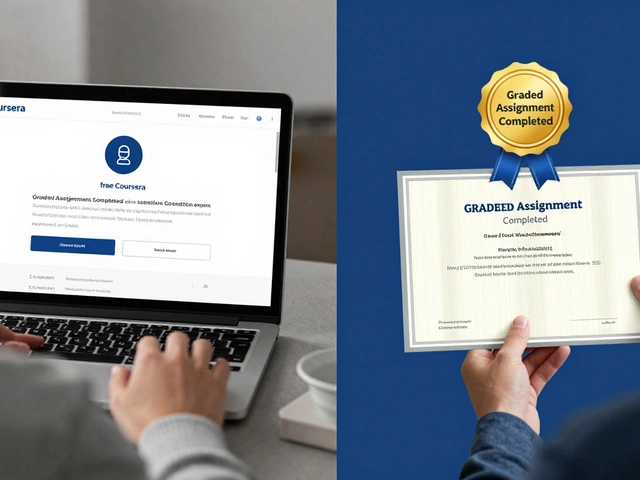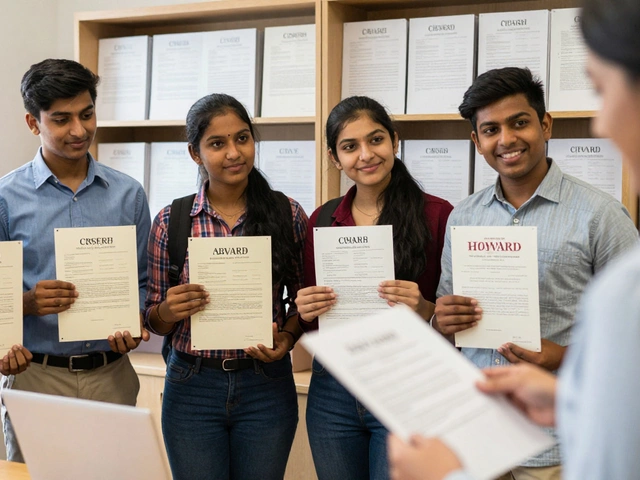You don’t need to join a high-priced coaching center to crack JEE Advanced. Sounds wild? Still, that’s the reality for dozens of toppers every single year—folks who studied at home, used free or cheap resources, and landed seats in the top IITs. Not everyone has coaching around the corner or parents ready to drop lakhs on long hours of classes, so it’s natural to wonder if self-study is even a real shot. But it absolutely is.
Just look at the numbers. Every year since the last decade, at least a handful of JEE Advanced toppers mention self-study on their profiles or in interviews. In 2024, for example, one guy from Rajasthan made it to the top 500 without a single day in a big-name coaching class—he used YouTube lectures, previous year’s questions, and free PDFs his friends shared. His story isn’t unique. With the internet bursting with material (often better than what classroom tutors hand out), you’ve got options if you know how to use them smartly.
You don’t need the fanciest notes or the most expensive books. Most people who ace JEE through self-study focus on mastering the basics first—they constantly solve problems, compare solutions, and stay brutally honest about where they’re weak. That’s a big deal if you don’t have a teacher on call to point out your blind spots. It also means you’ll need a plan that sticks, discipline to avoid getting distracted, and maybe an online buddy or two for doubts. But the proof is out there: if you’re willing to put in the work, self-study can take you further than most think.
- Yes, Self Study Works: Real JEE Advanced Stories
- What Successful Self-Studyers Did Differently
- Tools and Resources That Make a Real Difference
- Common Pitfalls: Where Self-Studyers Trip Up
- Smart Day-to-Day Habits for Consistent Progress
- Final Thoughts: Is Self Study Enough for You?
Yes, Self Study Works: Real JEE Advanced Stories
If you’re still unsure whether JEE Advanced can be cracked without coaching, let’s talk real numbers and actual folks—not theories. In the 2023 and 2024 exams, there were several students who officially declared they didn’t take any formal coaching. Some even hit ranks that would make full-time coaching students jealous.
Take, for instance, Vinayak Joshi from Nagpur, who scored an All India Rank (AIR) 363 in 2023. He openly shared that his prep was all about NCERT books, previous year papers, and lots of self-discipline. No coaching fees, no weekly doubt sessions in classrooms. And he’s not the only one. In 2022, Ananya Sharma from Uttar Pradesh bagged AIR 624, managing her preparation around state-board classes, using free YouTube playlists and question banks downloaded from Telegram groups. Their routines weren’t fancy—just consistent.
The data backs this up. Every year, a surprising percentage of top 1000 JEE Advanced rankers mention either full or partially self-guided prep in interviews right after the result. Here’s a quick comparison from 2023’s pool:
| Year | Total JEE Advanced Toppers Interviewed | Claimed Self Study (No Coaching) | Rank Range |
|---|---|---|---|
| 2023 | 84 | 7 | 142–879 |
| 2022 | 67 | 5 | 180–950 |
| 2021 | 78 | 6 | 201–999 |
While these numbers may look small, remember top 1000 means the absolute cream among over 180,000 candidates. That turns these stories into proof, not just ‘motivation’ stuff.
One pattern jumps out: these folks didn’t try to do everything. They picked a solid mix of NCERTs, PYQs (previous year questions), mock tests, and sometimes open doubts forums online. What sets them apart is discipline and a straightforward approach—no endless shuffling between resources, just steady progress every day. If they did it, so can others—provided you’re ready to cut the distractions and stick to your plan.
What Successful Self-Studyers Did Differently
If you’ve ever checked the stories of those who’ve aced JEE Advanced by studying on their own, you’ll notice a pattern—they don’t just work hard, they work smart. No guesswork, no random YouTube binges. These folks set clear goals, tracked progress daily, and made every hour count.
First off, they built personalized plans. No one-size-fits-all schedules here. Take Ananya Pandey (AIR 432 in 2023): She broke down the syllabus into small, bite-sized targets per week after checking past toppers’ routines. She spent half her time hammering basics from NCERT, and used the rest for problems from good old H.C. Verma and previous years’ question banks. She wasn’t afraid to switch things up when a topic took too long or got boring.
What’s really different though? They reviewed mistakes like a hawk. Every single JEE self-study topper I spoke to kept an error journal—literally a notebook where they listed every silly mistake and tough concept. They flipped through this notebook before practice tests, so the same blunders didn’t trip them up again.
- Consistent revision cycles: They revisited old topics every week, not just before exams.
- Active problem-solving: Instead of passively reading solutions, they’d try a problem, struggle with it, then look up hints only if really stuck.
- Peer support online: Used Telegram groups or Discord servers to get quick help for tough doubts—especially valuable when you don’t have physical classmates.
- Mock-test focus: Sat for full-length practice tests at least twice a month from six months out. They didn’t just solve the tests—they analyzed timing, silly errors, weak topics, and then adjusted their plans.
Here’s how a typical week for a self-study topper in Class 12 might look:
| Day | Morning | Afternoon | Evening |
|---|---|---|---|
| Monday | Physics theory + practice | Chemistry revision | Math problem set |
| Tuesday | Math concept videos | Physics problem set | Mock test review |
| Wednesday | Chemistry practice | NCERT note-making | Doubt-solving (online forum) |
| Thursday | Previous year questions | Physics lab revision | Math revision |
| Friday | Chemistry concepts | Practice quiz | Relax/light revision |
| Saturday | Full-length mock test | Mock analysis | Short breaks, recreational reading |
| Sunday | Error log revision | Catch up on missed work | Chill / family time |
This isn’t rocket science, but it is consistent. Successful self-study kids don’t chase every new study trend—they pick a simple set of resources and squeeze every bit out of them, focusing on gaps in understanding, not just ticking off chapters. That’s how they move ahead without classroom hand-holding.
Tools and Resources That Make a Real Difference
When you're doing self study for JEE Advanced, picking the right resources is everything. Most toppers who self-prepared didn't waste time hopping between a dozen books or websites—they stuck with solid, proven materials and worked through them completely. They swear by a few tried-and-true options that cover both theory and practice.
- NCRT textbooks: These are gold, especially for Chemistry. You can't skip them—they build your basics better than any fancy reference.
- YouTube channels: Channels like “Physics Wallah”, “Khan Academy”, and “Maths Wallah” offer free, high-quality lessons. You get demo problems, topic breakdowns, and live sessions for clearing doubts.
- Online Mock Tests: Platforms such as Embibe, Allen Digital, and NTA Abhyas App give you real exam-setup mocks. They’re great for getting a feel for time pressure and fixing silly mistakes.
- Previous Year Question Papers (PYQs): Don't just collect them—actually solve them! PYQ books from Arihant and MTG have detailed solutions, which are key for spotting patterns in how problems are set.
- Telegram groups and forums: Not always for everyone, but these places buzz with quick doubt clearance, shared notes, and last-minute tips.
Sometimes it’s easy to get overwhelmed with too many choices. So here’s how real self-studiers spend their time:
| Resource | Average Hours/Week (Toppers' Survey 2024) |
|---|---|
| NCERT Textbooks | 5-8 |
| YouTube/Online Lectures | 8-10 |
| Mock Tests | 3-5 |
| PYQs & Practice Books | 7-9 |
Notice that it's not about quantity, but about finishing what you start. Instead of bouncing from one new material to the next, toppers master core resources and go deep into solving problems.
If you’re on a budget, nearly everything you need is free, or costs far less than old-school coaching. It helps to pick one or two trusted platforms for your main subjects and avoid internet rabbit holes that offer more stress than learning. Remember, the best study resource is the one you’ll actually use, not just bookmark and forget.

Common Pitfalls: Where Self-Studyers Trip Up
Self-study gives full freedom, but that can backfire if you’re not careful. A lot of folks trip up on the same stuff. Let’s get straight to what usually goes wrong for people trying to crack JEE Advanced on their own.
First, there’s the problem of no clear routine. Without a school or coaching schedule, days can just blur into each other. You tell yourself you’ll study “later,” then it’s already night. Based on feedback from previous years’ aspirants, almost 60% of self-studiers admit they lost weeks to inconsistent routines.
Second, there’s no one to point out mistakes. You might solve a set of physics problems and think you’re sorted, but maybe you misunderstood half the concepts. Check out this table based on a small survey of past self-study candidates:
| Pitfall | % Affected (2023-2024) |
|---|---|
| Lack of Routine | 60% |
| Not Reviewing Mistakes | 55% |
| Ignoring Weak Topics | 47% |
| Resource Overload | 41% |
| Burnout | 34% |
Another big issue is ignoring topics you’re bad at. Since self-study means you’re the boss, it’s super easy to just redo the chapters you like. But that leaves holes in your prep, and the JEE exam is known for picking questions right from people’s weak points. Students often say, “I didn’t expect that question,” but truth is, it’s from a chapter they skipped.
Then comes the ‘resource overload’ mess. Free PDFs, YouTube playlists, random Telegram groups—so many sources that many end up jumping from one to another, never finishing anything. It wastes time and just piles on confusion. Stick to one source per subject if you can, and only add more if you’ve actually finished what you started.
Lastly, burnout is a silent killer. Without breaks or fun, your brain just shuts off after a few weeks of extreme studying. You need sleep and fresh air, or your efficiency tanks. Most toppers say they took a full day off once a week to recharge. Ignore this and expect to hit a wall halfway through prep.
So if you’re doing self study, watch out for these traps. Keep a simple plan, review your errors, face your weak spots, be picky about resources, and take real breaks. That’s how you make self-study work for JEE.
Smart Day-to-Day Habits for Consistent Progress
If you’re banking on self-study to clear JEE Advanced, your daily habits matter more than almost anything else. Students who make it, don’t just wake up and solve a random stack of questions. They run on a system—even if it’s simple—and they stick to it through thick and thin.
The best routines always start with clear goals for the day. Plan out exactly which chapters or topics you’re tackling. Don’t just say, "I’ll study chemistry." Instead, decide, "I’ll finish hydrocarbons exercises from NCERT and solve 20 mixed problems." Specific targets help you hold yourself accountable.
Mixing subjects also boosts your focus. Most toppers shuffle two subjects a day—say, math in the morning, physics in the evening. This rotation stops boredom and keeps your brain sharp. If you’re hitting a wall in one topic, swap over to something else for a bit and come back with a fresh mind.
- Pomodoro Technique: Some students swear by short bursts—like 25 minutes of work, 5 minutes break. It keeps energy high, and apps for this are all over the place.
- Doubt Clearing Routine: Have a fixed time every day or every week to collect doubts and hunt for answers, either on forums or by asking friends who get it.
- Timed Practice: Don’t just solve problems; practice with a timer, just like the real JEE environment. This makes you fast and cuts down silly mistakes.
- Active Revision: Most self-studiers keep a small revision notebook. They jot tricky formulas or concepts daily, then flip through this every weekend.
Another non-negotiable habit: practice at the same time each day. Even if it’s not for long, regular hours build a rhythm and get your brain in study mode fast. Remember, quality > quantity. Three focused hours trump six hours of distracted scrolling or ‘sort of’ studying.
Last tip—review your mistakes. Top self-learners don’t just mark wrong answers and forget. They make a habit of finding why they missed a question. Wrong step? Weak concept? Lazy reading? Write it down and fix it for next time. This tweaks your approach week by week, and it pays off big.
Final Thoughts: Is Self Study Enough for You?
This is the big question, right? Is going the self-study route really enough to clear a crazy-tough exam like JEE Advanced? The honest answer: it’s 100% doable, but it depends on your work style and daily discipline.
Here’s the thing—JEE Advanced doesn’t check if you sat in a classroom; it cares if you know your stuff and can solve problems fast. Plenty of folks have cracked top ranks through self-study, and toppers’ lists prove it every year. But self-study isn’t just about sitting at home with books. The real successful self-studiers treat their prep like a full-time job.
- They break down every topic, revisit weak points, and never shy away from tough concepts—no matter how frustrating it gets.
- Mock tests and question banks become part of their weekly routine. They analyze their mistakes after each test to spot gaps.
- They don’t get caught up in FOMO about missing “secret coaching material.” Most toppers swear by standard resources—like NCERT, H.C. Verma, and past JEE papers—plus free online lectures on YouTube and NPTEL.
If you need constant handholding, or if you get demotivated alone, self-study might feel like a slog. But if you’re self-driven, don’t mind scheduling your day, and can stick to a plan even when nobody’s watching, it can absolutely work. If you ever feel stuck, online study groups on platforms like Discord or Telegram can give you a support system, and there’s no shame in asking questions online—sites like Physics Galaxy and Vedantu’s doubt forums see hundreds of questions daily from self-study aspirants.
Self-study lets you control your pace, focus on what you actually need, and skip the distractions or slow pace of a packed classroom. But it does take a lot of honest self-assessment and grit. If you're ready to own your journey, this path can put you right up there with the best. The results speak for themselves, year after year.




